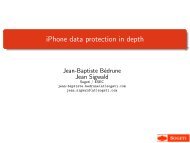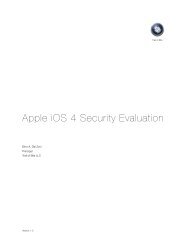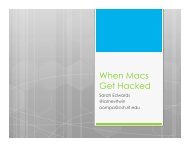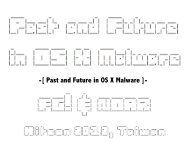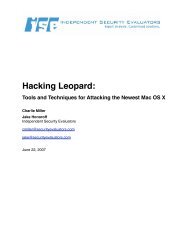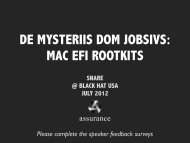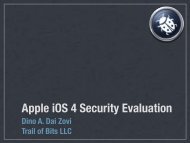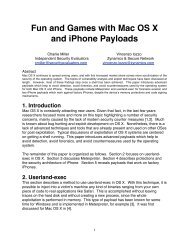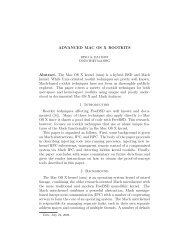iOS Kernel Exploitation --- IOKIT Edition - Reverse Engineering Mac ...
iOS Kernel Exploitation --- IOKIT Edition - Reverse Engineering Mac ...
iOS Kernel Exploitation --- IOKIT Edition - Reverse Engineering Mac ...
Create successful ePaper yourself
Turn your PDF publications into a flip-book with our unique Google optimized e-Paper software.
http://www.sektioneins.de<br />
<strong>iOS</strong> <strong>Kernel</strong> <strong>Exploitation</strong><br />
--- <strong>IOKIT</strong> <strong>Edition</strong> ---<br />
Stefan Esser
Who am I<br />
•Stefan Esser<br />
•from Cologne / Germany<br />
•in information security since 1998<br />
•PHP core developer since 2001<br />
•Month of PHP Bugs and Suhosin<br />
•recently focused on iPhone security (ASLR, jailbreak)<br />
•founder of SektionEins GmbH<br />
•currently also working as independent contractor<br />
Stefan Esser • <strong>iOS</strong> <strong>Kernel</strong> <strong>Exploitation</strong> - IOKit <strong>Edition</strong> • November 2011 • 2
Agenda<br />
• Introduction<br />
• <strong>Kernel</strong> Debugging<br />
• Auditing IOKit Drivers<br />
• <strong>Kernel</strong> <strong>Exploitation</strong><br />
• Stack Buffer Overflows<br />
• Heap Buffer Overflows<br />
• <strong>Kernel</strong> patches from Jailbreaks<br />
Stefan Esser • <strong>iOS</strong> <strong>Kernel</strong> <strong>Exploitation</strong> - IOKit <strong>Edition</strong> • November 2011 • 3
Part I<br />
Introduction<br />
Stefan Esser • <strong>iOS</strong> <strong>Kernel</strong> <strong>Exploitation</strong> - IOKit <strong>Edition</strong> • November 2011 • 4
<strong>Mac</strong> OS X vs. <strong>iOS</strong> (I)<br />
• <strong>iOS</strong> is based on XNU like <strong>Mac</strong> OS X<br />
• exploitation of kernel vulnerabilities is therefore similar<br />
• there are no mitigations inside the kernel e.g. heap/stack canaries<br />
• some kernel bugs can be found by auditing the open source XNU<br />
• some bugs are only/more interesting on <strong>iOS</strong><br />
Stefan Esser • <strong>iOS</strong> <strong>Kernel</strong> <strong>Exploitation</strong> - IOKit <strong>Edition</strong> • November 2011 • 5
<strong>Mac</strong> OS X vs. <strong>iOS</strong> (II)<br />
OS X<br />
<strong>iOS</strong><br />
user-land dereference bugs are not<br />
exploitable<br />
user-land dereference bugs are partially<br />
exploitable<br />
privilege escalation to root<br />
usually highest goal<br />
privilege escalation to root only beginning<br />
(need to escape sandbox everywhere)<br />
memory corruptions or code exec in<br />
kernel nice but usually not required<br />
memory corruption or code exec inside<br />
kernel always required<br />
kernel exploits only trigger-able as root<br />
are not interesting<br />
kernel exploits only trigger-able as root<br />
interesting for untethering exploits<br />
Stefan Esser • <strong>iOS</strong> <strong>Kernel</strong> <strong>Exploitation</strong> - IOKit <strong>Edition</strong> • November 2011 • 6
Types of <strong>Kernel</strong> Exploits<br />
• normal kernel exploits<br />
DYNAMIC CODESIGNING<br />
• privilege escalation from “mobile“ user in applications<br />
• break out of sandbox<br />
• disable code-signing and RWX protection for easier infection<br />
• must be implemented in 100% ROP<br />
• untethering exploits<br />
• kernel exploit as “root“ user during boot sequence<br />
• patch kernel to disable all security features in order to jailbreak<br />
• from <strong>iOS</strong> 4.3.0 also needs to be implemented in 100% ROP<br />
Stefan Esser • <strong>iOS</strong> <strong>Kernel</strong> <strong>Exploitation</strong> - IOKit <strong>Edition</strong> • November 2011 • 7
Getting Started<br />
• Best test-device: iPod 4G<br />
• State: jailbroken or development phone<br />
• Software: grab <strong>iOS</strong> firmware and decrypt kernel<br />
• Testing method: panic logs / kernel debugger<br />
Stefan Esser • <strong>iOS</strong> <strong>Kernel</strong> <strong>Exploitation</strong> - IOKit <strong>Edition</strong> • November 2011 • 8
Part II<br />
<strong>Kernel</strong> Debugging<br />
Stefan Esser • <strong>iOS</strong> <strong>Kernel</strong> <strong>Exploitation</strong> - IOKit <strong>Edition</strong> • November 2011 • 9
<strong>iOS</strong> <strong>Kernel</strong> Debugging<br />
• no support for kernel level debugging by <strong>iOS</strong> SDK<br />
• developers are not supposed to do kernel work anyway<br />
• strings inside kernelcache indicate the presence of debugging code<br />
• boot arg “debug“ is used<br />
• and code of KDP seems there<br />
Stefan Esser • <strong>iOS</strong> <strong>Kernel</strong> <strong>Exploitation</strong> - IOKit <strong>Edition</strong> • November 2011 • 10
KDP on <strong>iOS</strong> 4<br />
• the OS X kernel debugger KDP is obviously inside the <strong>iOS</strong> kernel<br />
• but KDP does only work via ethernet or serial interface<br />
• how to communicate with KDP<br />
• the iPhone / iPad do not have ethernet or serial, do they<br />
Stefan Esser • <strong>iOS</strong> <strong>Kernel</strong> <strong>Exploitation</strong> - IOKit <strong>Edition</strong> • November 2011 • 11
iPhone Dock Connector (Pin-Out)<br />
PIN<br />
Desc<br />
1,2 GND<br />
3 Line Out - R+<br />
4 Line Out - L+<br />
5 Line In - R+<br />
6<br />
Line In - L+<br />
8 Video Out<br />
9 S-Video CHR Output<br />
10 S-Video LUM Output<br />
11 GND<br />
12 Serial TxD<br />
13 Serial RxD<br />
14 NC<br />
15,16 GND<br />
17 NC<br />
18 3.3V Power<br />
19,20<br />
12V Firewire Power<br />
21 Accessory Indicator/Serial Enable<br />
22 FireWire Data TPA-<br />
23 USB Power 5 VDC<br />
24 FireWire Data TPA+<br />
• iPhone Dock Connector has PINs for<br />
- Line Out / In<br />
- Video Out<br />
- USB<br />
- FireWire<br />
- Serial<br />
25 USB Data -<br />
26 FireWire Data TPB-<br />
27 USB Data +<br />
28 FireWire Data TPB+<br />
29,30 GND<br />
Stefan Esser • <strong>iOS</strong> <strong>Kernel</strong> <strong>Exploitation</strong> - IOKit <strong>Edition</strong> • November 2011 • 12
USB Serial to iPhone Dock Connector<br />
2 x mini-USB-B to USB-A cable<br />
470kΩ resistor<br />
Breakout Board<br />
FT232RL USB to Serial<br />
PodGizmo Connector<br />
Stefan Esser • <strong>iOS</strong> <strong>Kernel</strong> <strong>Exploitation</strong> - IOKit <strong>Edition</strong> • November 2011 • 13
Ingredients (I)<br />
• 470 kΩ resistor<br />
• used to bridge pin 1 and 21<br />
• activates the UART<br />
• costs a few cents<br />
Stefan Esser • <strong>iOS</strong> <strong>Kernel</strong> <strong>Exploitation</strong> - IOKit <strong>Edition</strong> • November 2011 • 14
Ingredients (II)<br />
• PodBreakout<br />
• easy access to dock connector<br />
pins<br />
• some revisions have reversed<br />
pins<br />
• even I was able to solder this<br />
• about 12 EUR<br />
Stefan Esser • <strong>iOS</strong> <strong>Kernel</strong> <strong>Exploitation</strong> - IOKit <strong>Edition</strong> • November 2011 • 15
Ingredients (III)<br />
• FT232RL Breakout Board<br />
• USB to Serial Convertor<br />
• also very easy to solder<br />
• about 10 EUR<br />
Stefan Esser • <strong>iOS</strong> <strong>Kernel</strong> <strong>Exploitation</strong> - IOKit <strong>Edition</strong> • November 2011 • 16
Ingredients (IV)<br />
• USB cables<br />
• type A -> mini type B<br />
• provides us with wires and<br />
connectors<br />
• costs a few EUR<br />
Stefan Esser • <strong>iOS</strong> <strong>Kernel</strong> <strong>Exploitation</strong> - IOKit <strong>Edition</strong> • November 2011 • 17
Final USB and USB Serial Cable<br />
• attaching a USB type A connector to the USB pins is<br />
very useful<br />
• we can now do SSH over USB<br />
• and kernel debug via serial line at the same time<br />
Stefan Esser • <strong>iOS</strong> <strong>Kernel</strong> <strong>Exploitation</strong> - IOKit <strong>Edition</strong> • November 2011 • 18
GDB and <strong>iOS</strong> KDP<br />
• GDB coming with the <strong>iOS</strong> SDK has ARM support<br />
• it also has KDP support<br />
• however it can only speak KDP over UDP<br />
• KDP over serial is not supported<br />
Stefan Esser • <strong>iOS</strong> <strong>Kernel</strong> <strong>Exploitation</strong> - IOKit <strong>Edition</strong> • November 2011 • 19
KDP over serial<br />
• KDP over serial is sending fake ethernet UDP over serial<br />
• SerialKDPProxy by David Elliott is able to act as serial/UDP proxy<br />
Stefan Esser • <strong>iOS</strong> <strong>Kernel</strong> <strong>Exploitation</strong> - IOKit <strong>Edition</strong> • November 2011 • 20
Activating KDP on the iPhone<br />
• KDP is only activated if the boot-arg “debug“ is set<br />
• boot-args can be set with e.g. redsn0w 0.9.8b4<br />
• or faked with a custom kernel<br />
• patch your kernel to get into KDP anytime (e.g. breakpoint in unused syscall)<br />
Name Value Meaning<br />
DB_HALT 0x01 Halt at boot-time and wait for debugger attach.<br />
DB_KPRT 0x08 Send kernel debugging kprintf output to serial port.<br />
... ... Other values might work but might be complicated to use.<br />
Stefan Esser • <strong>iOS</strong> <strong>Kernel</strong> <strong>Exploitation</strong> - IOKit <strong>Edition</strong> • November 2011 • 21
Using GDB...<br />
Stefan Esser • <strong>iOS</strong> <strong>Kernel</strong> <strong>Exploitation</strong> - IOKit <strong>Edition</strong> • November 2011 • 22
Part III<br />
Auditing IOKit Drivers<br />
Stefan Esser • <strong>iOS</strong> <strong>Kernel</strong> <strong>Exploitation</strong> - IOKit <strong>Edition</strong> • November 2011 • 23
IOKit <strong>Kernel</strong> Extensions<br />
• kernelcache contains prelinked KEXTs in __PRELINK_TEXT segment<br />
• these files are loaded KEXT<br />
• more than 130 of them<br />
• IDA 6.2 can handle this by default<br />
• earlier IDA versions require help from an idapython script<br />
Stefan Esser • <strong>iOS</strong> <strong>Kernel</strong> <strong>Exploitation</strong> - IOKit <strong>Edition</strong> • November 2011 • 24
List all KEXT<br />
Stefan Esser • <strong>iOS</strong> <strong>Kernel</strong> <strong>Exploitation</strong> - IOKit <strong>Edition</strong> • November 2011 • 25
IOKit Driver Classes (I)<br />
• IOKit drivers are implemented in a subset of C++<br />
• classes and their method tables can be found in kernelcache<br />
• main kernel IOKit classes even come with symbols<br />
Stefan Esser • <strong>iOS</strong> <strong>Kernel</strong> <strong>Exploitation</strong> - IOKit <strong>Edition</strong> • November 2011 • 26
IOKit Driver Classes (II) - MetaClass<br />
• most <strong>iOS</strong> IOKit classes come without symbols<br />
• however IOKit defines for almost all classes a so called MetaClass<br />
• MetaClass contains runtime information about the original object<br />
• constructors of MetaClass‘es leak name and parent objects<br />
R1 = Object Name<br />
R2 = Parent‘s MetaClass<br />
R3 = Methods of MetaClass<br />
Stefan Esser • <strong>iOS</strong> <strong>Kernel</strong> <strong>Exploitation</strong> - IOKit <strong>Edition</strong> • November 2011 • 27
IOKit Object Hierarchy - Full View<br />
all MetaClasses can be found through<br />
xrefs of<br />
__ZN11OSMetaClassC2EPKcPKS_j<br />
allows to determine the names of<br />
almost all IOKit classes (around 760)<br />
and allows to build the<br />
OKit object hierarchy tree<br />
Stefan Esser • <strong>iOS</strong> <strong>Kernel</strong> <strong>Exploitation</strong> - IOKit <strong>Edition</strong> • November 2011 • 28
IOKit Object Hierachy - Zoomed<br />
Stefan Esser • <strong>iOS</strong> <strong>Kernel</strong> <strong>Exploitation</strong> - IOKit <strong>Edition</strong> • November 2011 • 29
Using IOKit Class Hierarchy for Symbols<br />
• most IOKit classes are without symbols<br />
• however they are derived from base IOKit classes with symbols<br />
• we can create symbols for overloaded methods<br />
Some Methods from AppleBasebandUserClient<br />
__const:8043A270 DCD __ZN9IOService12tellChangeUpEm+1__const:8043A274 DCD<br />
__ZN9IOService16allowPowerChangeEm+1__const:8043A278 DCD<br />
__ZN9IOService17cancelPowerChangeEm+1__const:8043A27C DCD<br />
__ZN9IOService15powerChangeDoneEm+1__const:8043A280 DCD<br />
loc_80437D80+1__const:8043A284 DCD<br />
__ZN12IOUserClient24registerNotificationPortEP8ipc_portmy+1__const:8043A288 DCD<br />
__ZN12IOUserClient12initWithTaskEP4taskPvmP12OSDictionary+1__const:8043A28C DCD<br />
__ZN12IOUserClient12initWithTaskEP4taskPvm+1__const:8043A290 DCD<br />
sub_80437D5C+1__const:8043A294 DCD<br />
__ZN12IOUserClient10clientDiedEv+1__const:8043A298 DCD<br />
__ZN12IOUserClient10getServiceEv+1__const:8043A29C DCD<br />
__ZN12IOUserClient24registerNotificationPortEP8ipc_portmm+1__const:8043A2A0 DCD<br />
__ZN12IOUserClient24getNotificationSemaphoreEmPP9semaphore+1<br />
Stefan Esser • <strong>iOS</strong> <strong>Kernel</strong> <strong>Exploitation</strong> - IOKit <strong>Edition</strong> • November 2011 • 30
Using IOKit Class Hierarchy for Symbols<br />
Same Methods from IOUserClient<br />
• most IOKit classes are without symbols<br />
__const:80270100 DCD __ZN9IOService12tellChangeUpEm+1__const:80270104 DCD<br />
__ZN9IOService16allowPowerChangeEm+1__const:80270108 DCD<br />
• however __ZN9IOService17cancelPowerChangeEm+1__const:8027010C they are derived from base IOKit classes with DCD symbols<br />
__ZN9IOService15powerChangeDoneEm+1__const:80270110 DCD<br />
__ZN12IOUserClient14externalMethodEjP25IOExternalMet...__const:80270114 DCD<br />
• we __ZN12IOUserClient24registerNotificationPortEP8ipc_portmy+1__const:80270118 can create symbols for overloaded methods<br />
DCD<br />
__ZN12IOUserClient12initWithTaskEP4taskPvmP12OSDictionary+1__const:8027011C DCD<br />
__ZN12IOUserClient12initWithTaskEP4taskPvm+1__const:80270120 DCD<br />
__ZN12IOUserClient11clientCloseEv+1__const:80270124 DCD<br />
__ZN12IOUserClient10clientDiedEv+1__const:80270128 DCD<br />
Some Methods __ZN12IOUserClient10getServiceEv+1__const:8027012C from AppleBasebandUserClient<br />
DCD<br />
__ZN12IOUserClient24registerNotificationPortEP8ipc_portmm+1__const:80270130 DCD<br />
__const:8043A270 __ZN12IOUserClient24getNotificationSemaphoreEmPP9semaphore+1<br />
DCD __ZN9IOService12tellChangeUpEm+1__const:8043A274 DCD<br />
__ZN9IOService16allowPowerChangeEm+1__const:8043A278 DCD<br />
__ZN9IOService17cancelPowerChangeEm+1__const:8043A27C DCD<br />
__ZN9IOService15powerChangeDoneEm+1__const:8043A280 DCD<br />
loc_80437D80+1__const:8043A284 DCD<br />
__ZN12IOUserClient24registerNotificationPortEP8ipc_portmy+1__const:8043A288 DCD<br />
__ZN12IOUserClient12initWithTaskEP4taskPvmP12OSDictionary+1__const:8043A28C DCD<br />
__ZN12IOUserClient12initWithTaskEP4taskPvm+1__const:8043A290 DCD<br />
sub_80437D5C+1__const:8043A294 DCD<br />
__ZN12IOUserClient10clientDiedEv+1__const:8043A298 DCD<br />
__ZN12IOUserClient10getServiceEv+1__const:8043A29C DCD<br />
__ZN12IOUserClient24registerNotificationPortEP8ipc_portmm+1__const:8043A2A0 DCD<br />
__ZN12IOUserClient24getNotificationSemaphoreEmPP9semaphore+1<br />
Stefan Esser • <strong>iOS</strong> <strong>Kernel</strong> <strong>Exploitation</strong> - IOKit <strong>Edition</strong> • November 2011 • 31
Using IOKit Class Hierarchy for Symbols<br />
◦ borrowing from the parent class we get<br />
• AppleBasebandUserClient::externalMethod(unsigned int, IOExternalMethodArguments *,<br />
IOExternalMethodDispatch *, OSObject *, void *)<br />
• AppleBasebandUserClient::clientClose(void)<br />
Symbolized Methods from AppleBasebandUserClient<br />
__const:8043A270 DCD __ZN9IOService12tellChangeUpEm+1__const:8043A274 DCD<br />
__ZN9IOService16allowPowerChangeEm+1__const:8043A278 DCD<br />
__ZN9IOService17cancelPowerChangeEm+1__const:8043A27C DCD<br />
__ZN9IOService15powerChangeDoneEm+1__const:8043A280 DCD<br />
__ZN23AppleBasebandUserClient14externalMethodEjP25IOExtern...__const:8043A284 DCD<br />
__ZN12IOUserClient24registerNotificationPortEP8ipc_portmy+1__const:8043A288 DCD<br />
__ZN12IOUserClient12initWithTaskEP4taskPvmP12OSDictionary+1__const:8043A28C DCD<br />
__ZN12IOUserClient12initWithTaskEP4taskPvm+1__const:8043A290 DCD<br />
__ZN23AppleBasebandUserClient11clientCloseEv+1__const:8043A294 DCD<br />
__ZN12IOUserClient10clientDiedEv+1__const:8043A298 DCD<br />
__ZN12IOUserClient10getServiceEv+1__const:8043A29C DCD<br />
__ZN12IOUserClient24registerNotificationPortEP8ipc_portmm+1__const:8043A2A0 DCD<br />
__ZN12IOUserClient24getNotificationSemaphoreEmPP9semaphore+1<br />
Stefan Esser • <strong>iOS</strong> <strong>Kernel</strong> <strong>Exploitation</strong> - IOKit <strong>Edition</strong> • November 2011 • 32
Part IV<br />
<strong>Kernel</strong> <strong>Exploitation</strong> - Stack Buffer Overflow<br />
Stefan Esser • <strong>iOS</strong> <strong>Kernel</strong> <strong>Exploitation</strong> - IOKit <strong>Edition</strong> • November 2011 • 33
HFS Legacy Volume Name Stack Buffer Overflow<br />
• Credits: pod2g<br />
• triggers when a HFS image with overlong volume name is mounted<br />
• stack based buffer overflow in a character conversion routine<br />
• requires root permissions<br />
• used to untether <strong>iOS</strong> 4.2.1 - 4.2.8<br />
Stefan Esser • <strong>iOS</strong> <strong>Kernel</strong> <strong>Exploitation</strong> - IOKit <strong>Edition</strong> • November 2011 • 34
HFS Legacy Volume Name Stack Buffer Overflow<br />
int mac_roman_to_unicode(const Str31 hfs_str, UniChar *uni_str,<br />
__unused u_int32_t maxCharLen, u_int32_t *unicodeChars)<br />
{<br />
...<br />
p = hfs_str;<br />
u = uni_str;<br />
maxCharLen parameter<br />
available but unused<br />
Apple did not fix this function<br />
to use maxCharLen... They<br />
just fix some calls to the<br />
function.<br />
*unicodeChars = pascalChars = *(p++); /* pick up length byte */<br />
while (pascalChars--) {<br />
c = *(p++);<br />
loop counter<br />
is attacker supplied<br />
if ( (int8_t) c >= 0 ) { /* check if seven bit ascii */<br />
*(u++) = (UniChar) c; /* just pad high byte with zero */<br />
} else { /* its a hi bit character */<br />
UniChar uc;<br />
data is copied/encoded<br />
without length check<br />
}<br />
}<br />
...<br />
c &= 0x7F;<br />
*(u++) = uc = gHiBitBaseUnicode[c];<br />
...<br />
Stefan Esser • <strong>iOS</strong> <strong>Kernel</strong> <strong>Exploitation</strong> - IOKit <strong>Edition</strong> • November 2011 • 35
Legacy HFS Master Directory Block<br />
/* HFS Master Directory Block - 162 bytes */<br />
/* Stored at sector #2 (3rd sector) and second-to-last sector. */<br />
struct HFSMasterDirectoryBlock {<br />
u_int16_t drSigWord; /* == kHFSSigWord */<br />
u_int32_t drCrDate; /* date and time of volume creation */<br />
u_int32_t drLsMod; /* date and time of last modification */<br />
u_int16_t drAtrb; /* volume attributes */<br />
u_int16_t drNmFls; /* number of files in root folder */<br />
u_int16_t drVBMSt; /* first block of volume bitmap */<br />
u_int16_t drAllocPtr; /* start of next allocation search */<br />
u_int16_t drNmAlBlks; /* number of allocation blocks in volume */<br />
u_int32_t drAlBlkSiz; /* size (in bytes) of allocation blocks */<br />
u_int32_t drClpSiz; /* default clump size */<br />
u_int16_t drAlBlSt; /* first allocation block in volume */<br />
u_int32_t drNxtCNID; /* next unused catalog node ID */<br />
u_int16_t drFreeBks; /* number of unused allocation blocks */<br />
u_int8_t drVN[kHFSMaxVolumeNameChars + 1]; /* volume name */<br />
u_int32_t drVolBkUp; /* date and time of last backup */<br />
u_int16_t drVSeqNum; /* volume backup sequence number */<br />
...<br />
Stefan Esser • <strong>iOS</strong> <strong>Kernel</strong> <strong>Exploitation</strong> - IOKit <strong>Edition</strong> • November 2011 • 36
Hexdump of Triggering HFS Image<br />
Stefan Esser • <strong>iOS</strong> <strong>Kernel</strong> <strong>Exploitation</strong> - IOKit <strong>Edition</strong> • November 2011 • 37
Exploit Code<br />
int ret, fd; struct vn_ioctl vn; struct hfs_mount_args args;<br />
fd = open("/dev/vn0", O_RDONLY, 0);<br />
if (fd < 0) {<br />
puts("Can't open /dev/vn0 special file.");<br />
exit(1);<br />
}<br />
memset(&vn, 0, sizeof(vn));<br />
ioctl(fd, VNIOCDETACH, &vn);<br />
vn.vn_file = "/usr/lib/exploit.hfs";<br />
vn.vn_control = vncontrol_readwrite_io_e;<br />
ret = ioctl(fd, VNIOCATTACH, &vn);<br />
close(fd);<br />
if (ret < 0) {<br />
puts("Can't attach vn0.");<br />
exit(1);<br />
}<br />
memset(&args, 0, sizeof(args));<br />
args.fspec = "/dev/vn0";<br />
args.hfs_uid = args.hfs_gid = 99;<br />
args.hfs_mask = 0x1c5;<br />
ret = mount("hfs", "/mnt/", MNT_RDONLY, &args);<br />
Stefan Esser • <strong>iOS</strong> <strong>Kernel</strong> <strong>Exploitation</strong> - IOKit <strong>Edition</strong> • November 2011 • 38
◦now lets analyze the panic log...<br />
Stefan Esser • <strong>iOS</strong> <strong>Kernel</strong> <strong>Exploitation</strong> - IOKit <strong>Edition</strong> • November 2011 • 39
Paniclog<br />
Stefan Esser • <strong>iOS</strong> <strong>Kernel</strong> <strong>Exploitation</strong> - IOKit <strong>Edition</strong> • November 2011 • 40
Paniclog - Zoomed<br />
Stefan Esser • <strong>iOS</strong> <strong>Kernel</strong> <strong>Exploitation</strong> - IOKit <strong>Edition</strong> • November 2011 • 41
Paniclog - Zoomed<br />
Stefan Esser • <strong>iOS</strong> <strong>Kernel</strong> <strong>Exploitation</strong> - IOKit <strong>Edition</strong> • November 2011 • 42
Calling Function<br />
int<br />
hfs_to_utf8(ExtendedVCB *vcb, const Str31 hfs_str, ...)<br />
{<br />
int error;<br />
UniChar uniStr[MAX_HFS_UNICODE_CHARS];<br />
ItemCount uniCount;<br />
size_t utf8len;<br />
hfs_to_unicode_func_t hfs_get_unicode = VCBTOHFS(vcb)->hfs_get_unicode;<br />
error = hfs_get_unicode(hfs_str, uniStr, MAX_HFS_UNICODE_CHARS, &uniCount);<br />
if (uniCount == 0)<br />
error = EINVAL;<br />
if (error == 0) {<br />
error = utf8_encodestr(uniStr, uniCount * sizeof(UniChar), dstStr, &utf8len, maxDstLen , ':', 0);<br />
...<br />
Stefan Esser • <strong>iOS</strong> <strong>Kernel</strong> <strong>Exploitation</strong> - IOKit <strong>Edition</strong> • November 2011 • 43
Calling Function (II)<br />
No stack cookies in kernel<br />
buffer that is overflown<br />
Text<br />
call to<br />
mac_roman_to_unicode()<br />
should be 0<br />
to exit function<br />
Stefan Esser • <strong>iOS</strong> <strong>Kernel</strong> <strong>Exploitation</strong> - IOKit <strong>Edition</strong> • November 2011 • 44
Hexdump of Improved HFS Image<br />
uniCount R4 R5 R6 R7 PC<br />
Stefan Esser • <strong>iOS</strong> <strong>Kernel</strong> <strong>Exploitation</strong> - IOKit <strong>Edition</strong> • November 2011 • 45
Paniclog of Improved HFS Image<br />
THUMB mode<br />
Stefan Esser • <strong>iOS</strong> <strong>Kernel</strong> <strong>Exploitation</strong> - IOKit <strong>Edition</strong> • November 2011 • 46
From Overwritten PC to Code Execution<br />
• once we control PC we can jump anywhere in kernel space<br />
• in <strong>iOS</strong> a lot of kernel memory is executable<br />
• challenge is to put code into kernel memory<br />
• and to know its address<br />
• nemo‘s papers already show ways to do this for OS X<br />
Stefan Esser • <strong>iOS</strong> <strong>Kernel</strong> <strong>Exploitation</strong> - IOKit <strong>Edition</strong> • November 2011 • 47
<strong>Kernel</strong> Level ROP<br />
802D2300<br />
xxx<br />
xxx<br />
RWX page in kernel<br />
r7<br />
r4<br />
80033C08 gadget 2<br />
xxx<br />
80067C60<br />
r7<br />
copyin<br />
__text:80033C08 BLX R4__text:80033C0A POP<br />
400 length<br />
20000000<br />
802D2300<br />
src in<br />
user space<br />
RWX page in kernel<br />
803F5BC2 gadget 1 __text:803F5BC2 POP {R0-R2,R4,R7,PC}<br />
• kernel level ROP very attractive because limited amount of different <strong>iOS</strong> kernel versions<br />
• just copy data from user space to kernel memory<br />
• and return into it<br />
Stefan Esser • <strong>iOS</strong> <strong>Kernel</strong> <strong>Exploitation</strong> - IOKit <strong>Edition</strong> • November 2011 • 48
Back To Our Demo Overflow<br />
feasibility of partial address<br />
overwrite seems unlikely<br />
• previous methods not feasible in our situation<br />
• HFS volume name overflow is a unicode overflow<br />
• conversion routine cannot create addresses pointing to kernel space<br />
(>= 0x80000000 & we can return to user space memory<br />
Stefan Esser • <strong>iOS</strong> <strong>Kernel</strong> <strong>Exploitation</strong> - IOKit <strong>Edition</strong> • November 2011 • 49
Returning into User Space Memory<br />
mlock() to hardwire the<br />
memory so that it doesn‘t get<br />
paged out when entering<br />
kernel<br />
• unicode overflow allows us to return to 0x010000 or 0x010001<br />
• exploiting <strong>Mac</strong> OS X binary needs to map executable memory at this address<br />
• exploit can then mlock() the memory<br />
• and let the kernel just return to this address<br />
Stefan Esser • <strong>iOS</strong> <strong>Kernel</strong> <strong>Exploitation</strong> - IOKit <strong>Edition</strong> • November 2011 • 50
Part V<br />
<strong>Kernel</strong> <strong>Exploitation</strong> - Heap Buffer Overflow<br />
Stefan Esser • <strong>iOS</strong> <strong>Kernel</strong> <strong>Exploitation</strong> - IOKit <strong>Edition</strong> • November 2011 • 51
ndrv_setspec() Integer Overflow Vulnerability<br />
• Credits: Stefan Esser<br />
• inside the NDRV_SETDMXSPEC socket option handler<br />
• triggers when a high demux_count is used<br />
• integer overflow when allocating kernel memory<br />
• leads to a heap buffer overflow<br />
• requires root permissions<br />
• used to untether <strong>iOS</strong> 4.3.1 - 4.3.3<br />
Stefan Esser • <strong>iOS</strong> <strong>Kernel</strong> <strong>Exploitation</strong> - IOKit <strong>Edition</strong> • November 2011 • 52
ndrv_setspec() Integer Overflow Vulnerability<br />
bzero(&proto_param, sizeof(proto_param));<br />
proto_param.demux_count = ndrvSpec.demux_count;<br />
user controlled<br />
demux_count<br />
/* Allocate storage for demux array */<br />
MALLOC(ndrvDemux, struct ndrv_demux_desc*, proto_param.demux_count *<br />
sizeof(struct ndrv_demux_desc), M_TEMP, M_WAITOK);<br />
if (ndrvDemux == NULL)<br />
return ENOMEM;<br />
/* Allocate enough ifnet_demux_descs */<br />
MALLOC(proto_param.demux_array, struct ifnet_demux_desc*,<br />
sizeof(*proto_param.demux_array) * ndrvSpec.demux_count,<br />
M_TEMP, M_WAITOK);<br />
if (proto_param.demux_array == NULL)<br />
error = ENOMEM;<br />
if (error == 0)<br />
{<br />
/* Copy the ndrv demux array from userland */<br />
error = copyin(user_addr, ndrvDemux,<br />
ndrvSpec.demux_count * sizeof(struct ndrv_demux_desc));<br />
ndrvSpec.demux_list = ndrvDemux;<br />
}<br />
same integer<br />
overflow<br />
therefore THIS is<br />
NOT overflowing<br />
integer multiplication<br />
with potential overflow<br />
Stefan Esser • <strong>iOS</strong> <strong>Kernel</strong> <strong>Exploitation</strong> - IOKit <strong>Edition</strong> • November 2011 • 53
ndrv_setspec() Integer Overflow Vulnerability<br />
if (error == 0)<br />
{<br />
/* At this point, we've at least got enough bytes to start looking around */<br />
u_int32_t demuxOn = 0;<br />
proto_param.demux_count = ndrvSpec.demux_count;<br />
proto_param.input = ndrv_input;<br />
proto_param.event = ndrv_event;<br />
because of<br />
high demux_count<br />
this loop loops<br />
very often<br />
}<br />
for (demuxOn = 0; demuxOn < ndrvSpec.demux_count; demuxOn++)<br />
{<br />
/* Convert an ndrv_demux_desc to a ifnet_demux_desc */<br />
error = ndrv_to_ifnet_demux(&ndrvSpec.demux_list[demuxOn],<br />
&proto_param.demux_array[demuxOn]);<br />
if (error)<br />
break;<br />
we need to be able<br />
}<br />
to set error<br />
at some point<br />
to stop overflowing<br />
function converts<br />
into different<br />
data format<br />
lets us overflow !!!<br />
Stefan Esser • <strong>iOS</strong> <strong>Kernel</strong> <strong>Exploitation</strong> - IOKit <strong>Edition</strong> • November 2011 • 54
ndrv_setspec() Integer Overflow Vulnerability<br />
int<br />
ndrv_to_ifnet_demux(struct ndrv_demux_desc* ndrv, struct ifnet_demux_desc* ifdemux)<br />
{<br />
bzero(ifdemux, sizeof(*ifdemux));<br />
}<br />
if (ndrv->type < DLIL_DESC_ETYPE2)<br />
{<br />
/* using old "type", not supported */<br />
return ENOTSUP;<br />
}<br />
if (ndrv->length > 28)<br />
{<br />
return EINVAL;<br />
}<br />
ifdemux->type = ndrv->type;<br />
ifdemux->data = ndrv->data.other;<br />
ifdemux->datalen = ndrv->length;<br />
return 0;<br />
user input can<br />
create these<br />
errors easily<br />
writes into<br />
too small buffer<br />
limited in what<br />
can be written<br />
BUT IT WRITES A POINTER !!!<br />
Stefan Esser • <strong>iOS</strong> <strong>Kernel</strong> <strong>Exploitation</strong> - IOKit <strong>Edition</strong> • November 2011 • 55
Triggering Code (no crash!)<br />
struct sockaddr_ndrv ndrv; int s, i;<br />
struct ndrv_protocol_desc ndrvSpec; char demux_list_buffer[15 * 32];<br />
s = socket(AF_NDRV, SOCK_RAW, 0);<br />
if (s < 0) {<br />
// ...<br />
}<br />
strlcpy((char *)ndrv.snd_name, "lo0", sizeof(ndrv.snd_name));<br />
ndrv.snd_len = sizeof(ndrv);<br />
ndrv.snd_family = AF_NDRV;<br />
if (bind(s, (struct sockaddr *)&ndrv, sizeof(ndrv)) < 0) {<br />
// ...<br />
}<br />
example most<br />
probably does<br />
not crash due<br />
to checks inside<br />
ndrv_to_ifnet_demux<br />
memset(demux_list_buffer, 0x55, sizeof(demux_list_buffer));<br />
for (i = 0; i < 15; i++) {<br />
/* fill type with a high value */<br />
demux_list_buffer[0x00 + i*32] = 0xFF;<br />
demux_list_buffer[0x01 + i*32] = 0xFF;<br />
/* fill length with a small value < 28 */<br />
demux_list_buffer[0x02 + i*32] = 0x04;<br />
demux_list_buffer[0x03 + i*32] = 0x00;<br />
}<br />
high demux_count<br />
triggers<br />
integer overflow<br />
ndrvSpec.version = 1; ndrvSpec.protocol_family = 0x1234;<br />
ndrvSpec.demux_count = 0x4000000a; ndrvSpec.demux_list = &demux_list_buffer;<br />
setsockopt(s, SOL_NDRVPROTO, NDRV_SETDMXSPEC, &ndrvSpec, sizeof(struct ndrv_protocol_desc));<br />
Stefan Esser • <strong>iOS</strong> <strong>Kernel</strong> <strong>Exploitation</strong> - IOKit <strong>Edition</strong> • November 2011 • 56
MALLOC() and Heap Buffer Overflows<br />
• the vulnerable code uses MALLOC() to allocate memory<br />
• MALLOC() is a macro that calls _MALLOC()<br />
• _MALLOC() is a wrapper around kalloc() that adds a short header (allocsize)<br />
• kalloc() is also a wrapper that uses<br />
• kmem_alloc() for large blocks of memory<br />
• zalloc() for small blocks of memory<br />
◦ we only concentrate on zalloc() because it is the only relevant allocator here<br />
Stefan Esser • <strong>iOS</strong> <strong>Kernel</strong> <strong>Exploitation</strong> - IOKit <strong>Edition</strong> • November 2011 • 57
Zone Allocator - zalloc()<br />
• zalloc() allocates memory in so<br />
called zones<br />
• each zone is described by a zone<br />
struct and has a zone name<br />
• a zone consists of a number of<br />
memory pages<br />
• each allocated block inside a<br />
zone is of the same size<br />
• free elements are stored in<br />
a linked list<br />
struct zone {<br />
int count; /* Number of elements used now */<br />
vm_offset_t free_elements;<br />
decl_lck_mtx_data(,lock) /* zone lock */<br />
lck_mtx_ext_t lock_ext; /* placeholder for indirect mutex */<br />
lck_attr_t lock_attr; /* zone lock attribute */<br />
lck_grp_t lock_grp; /* zone lock group */<br />
lck_grp_attr_t lock_grp_attr; /* zone lock group attribute */<br />
vm_size_t cur_size; /* current memory utilization */<br />
vm_size_t max_size; /* how large can this zone grow */<br />
vm_size_t elem_size; /* size of an element */<br />
vm_size_t alloc_size; /* size used for more memory */<br />
unsigned int<br />
/* boolean_t */ exhaustible :1, /* (F) merely return if empty */<br />
/* boolean_t */ collectable :1, /* (F) garbage collect empty pages */<br />
/* boolean_t */ expandable :1, /* (T) expand zone (with message) */<br />
/* boolean_t */ allows_foreign :1,/* (F) allow non-zalloc space */<br />
/* boolean_t */ doing_alloc :1, /* is zone expanding now */<br />
/* boolean_t */ waiting :1, /* is thread waiting for expansion */<br />
/* boolean_t */ async_pending :1, /* asynchronous allocation pending */<br />
/* boolean_t */ doing_gc :1, /* garbage collect in progress */<br />
/* boolean_t */ noencrypt :1;<br />
struct zone * next_zone; /* Link for all-zones list */<br />
call_entry_data_t call_async_alloc; /* callout for asynchronous alloc */<br />
const char *zone_name; /* a name for the zone */<br />
#if ZONE_DEBUG<br />
queue_head_t active_zones; /* active elements */<br />
#endif /* ZONE_DEBUG */<br />
};<br />
Stefan Esser • <strong>iOS</strong> <strong>Kernel</strong> <strong>Exploitation</strong> - IOKit <strong>Edition</strong> • November 2011 • 58
Zone Allocator - Zones<br />
Stefan Esser • <strong>iOS</strong> <strong>Kernel</strong> <strong>Exploitation</strong> - IOKit <strong>Edition</strong> • November 2011 • 59
Zone Allocator - Adding New Memory<br />
MY_ZONE<br />
head of freelist<br />
0<br />
• when a zone is created or later grown it<br />
starts with no memory and an empty freelist<br />
• first new memory is allocated<br />
(usually a 4k page)<br />
• it is split into the zone‘s element size<br />
• each element is added to the freelist<br />
• elements in freelist are in reverse order<br />
Stefan Esser • <strong>iOS</strong> <strong>Kernel</strong> <strong>Exploitation</strong> - IOKit <strong>Edition</strong> • November 2011 • 60
Zone Allocator - Adding New Memory<br />
MY_ZONE<br />
head of freelist<br />
0<br />
• when a zone is created or later grown it<br />
starts with no memory and an empty freelist<br />
• first new memory is allocated<br />
(usually a 4k page)<br />
• it is split into the zone‘s element size<br />
• each element is added to the freelist<br />
• elements in freelist are in reverse order<br />
Stefan Esser • <strong>iOS</strong> <strong>Kernel</strong> <strong>Exploitation</strong> - IOKit <strong>Edition</strong> • November 2011 • 61
Zone Allocator - Adding New Memory<br />
MY_ZONE<br />
head of freelist<br />
0<br />
• when a zone is created or later grown it<br />
starts with no memory and an empty freelist<br />
• first new memory is allocated<br />
(usually a 4k page)<br />
• it is split into the zone‘s element size<br />
• each element is added to the freelist<br />
• elements in freelist are in reverse order<br />
Stefan Esser • <strong>iOS</strong> <strong>Kernel</strong> <strong>Exploitation</strong> - IOKit <strong>Edition</strong> • November 2011 • 62
Zone Allocator - Adding New Memory<br />
MY_ZONE<br />
head of freelist<br />
1<br />
1<br />
• when a zone is created or later grown it<br />
starts with no memory and an empty freelist<br />
1<br />
• first new memory is allocated<br />
(usually a 4k page)<br />
• it is split into the zone‘s element size<br />
• each element is added to the freelist<br />
• elements in freelist are in reverse order<br />
Stefan Esser • <strong>iOS</strong> <strong>Kernel</strong> <strong>Exploitation</strong> - IOKit <strong>Edition</strong> • November 2011 • 63
Zone Allocator - Adding New Memory<br />
MY_ZONE<br />
head of freelist<br />
2<br />
• when a zone is created or later grown it<br />
starts with no memory and an empty freelist<br />
• first new memory is allocated<br />
(usually a 4k page)<br />
• it is split into the zone‘s element size<br />
• each element is added to the freelist<br />
• elements in freelist are in reverse order<br />
1<br />
2<br />
2<br />
1<br />
Stefan Esser • <strong>iOS</strong> <strong>Kernel</strong> <strong>Exploitation</strong> - IOKit <strong>Edition</strong> • November 2011 • 64
Zone Allocator - Adding New Memory<br />
MY_ZONE<br />
head of freelist<br />
3<br />
• when a zone is created or later grown it<br />
starts with no memory and an empty freelist<br />
• first new memory is allocated<br />
(usually a 4k page)<br />
• it is split into the zone‘s element size<br />
• each element is added to the freelist<br />
• elements in freelist are in reverse order<br />
1<br />
2<br />
3<br />
3<br />
2<br />
1<br />
Stefan Esser • <strong>iOS</strong> <strong>Kernel</strong> <strong>Exploitation</strong> - IOKit <strong>Edition</strong> • November 2011 • 65
Zone Allocator - Adding New Memory<br />
MY_ZONE<br />
head of freelist<br />
4<br />
• when a zone is created or later grown it<br />
starts with no memory and an empty freelist<br />
• first new memory is allocated<br />
(usually a 4k page)<br />
• it is split into the zone‘s element size<br />
• each element is added to the freelist<br />
• elements in freelist are in reverse order<br />
1<br />
2<br />
3<br />
4<br />
4<br />
3<br />
2<br />
1<br />
Stefan Esser • <strong>iOS</strong> <strong>Kernel</strong> <strong>Exploitation</strong> - IOKit <strong>Edition</strong> • November 2011 • 66
Zone Allocator - Adding New Memory<br />
MY_ZONE<br />
head of freelist<br />
5<br />
• when a zone is created or later grown it<br />
starts with no memory and an empty freelist<br />
• first new memory is allocated<br />
(usually a 4k page)<br />
• it is split into the zone‘s element size<br />
• each element is added to the freelist<br />
• elements in freelist are in reverse order<br />
1<br />
2<br />
3<br />
4<br />
5<br />
5<br />
4<br />
3<br />
2<br />
1<br />
Stefan Esser • <strong>iOS</strong> <strong>Kernel</strong> <strong>Exploitation</strong> - IOKit <strong>Edition</strong> • November 2011 • 67
Zone Allocator - Adding New Memory<br />
MY_ZONE<br />
head of freelist<br />
6<br />
• when a zone is created or later grown it<br />
starts with no memory and an empty freelist<br />
• first new memory is allocated<br />
(usually a 4k page)<br />
• it is split into the zone‘s element size<br />
• each element is added to the freelist<br />
• elements in freelist are in reverse order<br />
1<br />
2<br />
3<br />
4<br />
5<br />
6<br />
6<br />
5<br />
4<br />
3<br />
1<br />
2<br />
Stefan Esser • <strong>iOS</strong> <strong>Kernel</strong> <strong>Exploitation</strong> - IOKit <strong>Edition</strong> • November 2011 • 68
Zone Allocator - Adding New Memory<br />
MY_ZONE<br />
head of freelist<br />
7<br />
• when a zone is created or later grown it<br />
starts with no memory and an empty freelist<br />
• first new memory is allocated<br />
(usually a 4k page)<br />
• it is split into the zone‘s element size<br />
• each element is added to the freelist<br />
• elements in freelist are in reverse order<br />
1<br />
2<br />
3<br />
4<br />
5<br />
6<br />
7<br />
7<br />
6<br />
5<br />
4<br />
1<br />
2<br />
3<br />
Stefan Esser • <strong>iOS</strong> <strong>Kernel</strong> <strong>Exploitation</strong> - IOKit <strong>Edition</strong> • November 2011 • 69
Zone Allocator - Allocating and Freeing Memory<br />
MY_ZONE<br />
head of freelist<br />
7<br />
7<br />
1<br />
• when memory blocks are allocated they<br />
are removed from the freelist<br />
• when they are freed they are returned<br />
to the freelist<br />
2<br />
3<br />
4<br />
5<br />
6<br />
7<br />
6<br />
5<br />
4<br />
1<br />
2<br />
3<br />
Stefan Esser • <strong>iOS</strong> <strong>Kernel</strong> <strong>Exploitation</strong> - IOKit <strong>Edition</strong> • November 2011 • 70
Zone Allocator - Allocating and Freeing Memory<br />
MY_ZONE<br />
head of freelist<br />
6<br />
6<br />
1<br />
• when memory blocks are allocated they<br />
are removed from the freelist<br />
• when they are freed they are returned<br />
to the freelist<br />
2<br />
3<br />
4<br />
5<br />
6<br />
7<br />
5<br />
4<br />
3<br />
1<br />
2<br />
Stefan Esser • <strong>iOS</strong> <strong>Kernel</strong> <strong>Exploitation</strong> - IOKit <strong>Edition</strong> • November 2011 • 71
Zone Allocator - Allocating and Freeing Memory<br />
MY_ZONE<br />
head of freelist<br />
5<br />
5<br />
1<br />
• when memory blocks are allocated they<br />
are removed from the freelist<br />
• when they are freed they are returned<br />
to the freelist<br />
2<br />
3<br />
4<br />
5<br />
6<br />
7<br />
4<br />
3<br />
2<br />
1<br />
Stefan Esser • <strong>iOS</strong> <strong>Kernel</strong> <strong>Exploitation</strong> - IOKit <strong>Edition</strong> • November 2011 • 72
Zone Allocator - Allocating and Freeing Memory<br />
MY_ZONE<br />
head of freelist<br />
4<br />
4<br />
1<br />
• when memory blocks are allocated they<br />
are removed from the freelist<br />
• when they are freed they are returned<br />
to the freelist<br />
2<br />
3<br />
4<br />
5<br />
6<br />
7<br />
3<br />
2<br />
1<br />
Stefan Esser • <strong>iOS</strong> <strong>Kernel</strong> <strong>Exploitation</strong> - IOKit <strong>Edition</strong> • November 2011 • 73
Zone Allocator - Allocating and Freeing Memory<br />
MY_ZONE<br />
head of freelist<br />
3<br />
3<br />
1<br />
• when memory blocks are allocated they<br />
are removed from the freelist<br />
• when they are freed they are returned<br />
to the freelist<br />
2<br />
3<br />
4<br />
5<br />
6<br />
7<br />
2<br />
1<br />
Stefan Esser • <strong>iOS</strong> <strong>Kernel</strong> <strong>Exploitation</strong> - IOKit <strong>Edition</strong> • November 2011 • 74
Zone Allocator - Allocating and Freeing Memory<br />
MY_ZONE<br />
head of freelist<br />
5<br />
5<br />
1<br />
• when memory blocks are allocated they<br />
are removed from the freelist<br />
• when they are freed they are returned<br />
to the freelist<br />
2<br />
3<br />
4<br />
5<br />
6<br />
7<br />
3<br />
2<br />
1<br />
Stefan Esser • <strong>iOS</strong> <strong>Kernel</strong> <strong>Exploitation</strong> - IOKit <strong>Edition</strong> • November 2011 • 75
Zone Allocator - Allocating and Freeing Memory<br />
MY_ZONE<br />
head of freelist<br />
7<br />
7<br />
1<br />
• when memory blocks are allocated they<br />
are removed from the freelist<br />
• when they are freed they are returned<br />
to the freelist<br />
2<br />
3<br />
4<br />
5<br />
6<br />
7<br />
5<br />
3<br />
2<br />
1<br />
Stefan Esser • <strong>iOS</strong> <strong>Kernel</strong> <strong>Exploitation</strong> - IOKit <strong>Edition</strong> • November 2011 • 76
Zone Allocator - Allocating and Freeing Memory<br />
MY_ZONE<br />
head of freelist<br />
6<br />
6<br />
1<br />
• when memory blocks are allocated they<br />
are removed from the freelist<br />
• when they are freed they are returned<br />
to the freelist<br />
2<br />
3<br />
4<br />
5<br />
6<br />
7<br />
7<br />
5<br />
3<br />
1<br />
2<br />
Stefan Esser • <strong>iOS</strong> <strong>Kernel</strong> <strong>Exploitation</strong> - IOKit <strong>Edition</strong> • November 2011 • 77
Zone Allocator - Allocating and Freeing Memory<br />
MY_ZONE<br />
head of freelist<br />
4<br />
4<br />
1<br />
• when memory blocks are allocated they<br />
are removed from the freelist<br />
• when they are freed they are returned<br />
to the freelist<br />
2<br />
3<br />
4<br />
5<br />
6<br />
7<br />
6<br />
7<br />
5<br />
1<br />
2<br />
3<br />
Stefan Esser • <strong>iOS</strong> <strong>Kernel</strong> <strong>Exploitation</strong> - IOKit <strong>Edition</strong> • November 2011 • 78
Zone Allocator Freelist<br />
• freelist is as single linked list<br />
• zone struct points to head of freelist<br />
• the freelist is stored inbound<br />
• first 4 bytes of a free block point to next<br />
block on freelist<br />
Stefan Esser • <strong>iOS</strong> <strong>Kernel</strong> <strong>Exploitation</strong> - IOKit <strong>Edition</strong> • November 2011 • 79
Zone Allocator Freelist - Removing Element<br />
#define REMOVE_FROM_ZONE(zone, ret, type) \<br />
MACRO_BEGIN \<br />
(ret) = (type) (zone)->free_elements; \<br />
head of freelist<br />
if ((ret) != (type) 0) { \<br />
will be returned<br />
if (check_freed_element) { \<br />
if (!is_kernel_data_addr(((vm_offset_t *)(ret))[0]) || \<br />
((zone)->elem_size >= (2 * sizeof(vm_offset_t)) && \<br />
((vm_offset_t *)(ret))[((zone)->elem_size/sizeof(vm_offset_t))-1] != \<br />
((vm_offset_t *)(ret))[0])) \<br />
panic("a freed zone element has been modified");\<br />
if (zfree_clear) { \<br />
unsigned int ii; \<br />
for (ii = sizeof(vm_offset_t) / sizeof(uint32_t); \<br />
ii < zone->elem_size/sizeof(uint32_t) - sizeof(vm_offset_t) / sizeof(uint32_t); \<br />
ii++) \<br />
if (((uint32_t *)(ret))[ii] != (uint32_t)0xdeadbeef) \<br />
panic("a freed zone element has been modified");\<br />
} \<br />
} \<br />
(zone)->count++; \<br />
(zone)->free_elements = *((vm_offset_t *)(ret)); \<br />
} \<br />
MACRO_END<br />
new head of freelist is<br />
read from previous head<br />
grey code is only activated by debugging boot-args<br />
Apple seems to think about activating it by default<br />
Stefan Esser • <strong>iOS</strong> <strong>Kernel</strong> <strong>Exploitation</strong> - IOKit <strong>Edition</strong> • November 2011 • 80
Zone Allocator Freelist - Adding Element<br />
#define ADD_TO_ZONE(zone, element) \<br />
MACRO_BEGIN \<br />
if (zfree_clear) \<br />
{ unsigned int i; \<br />
for (i=0; \<br />
i < zone->elem_size/sizeof(uint32_t); \<br />
i++) \<br />
((uint32_t *)(element))[i] = 0xdeadbeef; \<br />
} \<br />
*((vm_offset_t *)(element)) = (zone)->free_elements; \<br />
current head of freelist<br />
is written to start of free block<br />
if (check_freed_element) { \<br />
if ((zone)->elem_size >= (2 * sizeof(vm_offset_t))) \<br />
((vm_offset_t *)(element))[((zone)->elem_size/sizeof(vm_offset_t))-1] = \<br />
(zone)->free_elements; \<br />
} \<br />
(zone)->free_elements = (vm_offset_t) (element); \<br />
free block is made<br />
the head of the freelist<br />
(zone)->count--; \<br />
MACRO_END<br />
grey code is only activated by debugging boot-args<br />
Apple seems to think about activating it by default<br />
Stefan Esser • <strong>iOS</strong> <strong>Kernel</strong> <strong>Exploitation</strong> - IOKit <strong>Edition</strong> • November 2011 • 81
Exploiting Heap Overflows in Zone Memory<br />
• attacking “application“ data<br />
• carefully crafting allocations / deallocations<br />
• interesting kernel data structure is allocated behind overflowing block<br />
• impact and further exploitation depends on the overwritten data structure<br />
◦ this is the way to go if Apple adds some mitigations in the future<br />
Stefan Esser • <strong>iOS</strong> <strong>Kernel</strong> <strong>Exploitation</strong> - IOKit <strong>Edition</strong> • November 2011 • 82
Exploiting Heap Overflows in Zone Memory<br />
• attacking inbound freelist of zone allocator<br />
• carefully crafting allocations / deallocations<br />
• free block is behind overflowing block<br />
• overflow allows to control next pointer in freelist<br />
• when this free block is used head of freelist is controlled<br />
• next allocation will return attacker supplied memory address<br />
• we can write any data anywhere<br />
Stefan Esser • <strong>iOS</strong> <strong>Kernel</strong> <strong>Exploitation</strong> - IOKit <strong>Edition</strong> • November 2011 • 83
<strong>Kernel</strong> Heap Manipulation<br />
• we need heap manipulation primitives<br />
• allocation of a block of specific size<br />
• deallocation of a block<br />
• for our demo vulnerability this is easy<br />
• allocation of kernel heap by connecting to a ndrv socket<br />
• length of socket name controls size of allocated heap block<br />
• deallocation of kernel heap by closing a socket<br />
Stefan Esser • <strong>iOS</strong> <strong>Kernel</strong> <strong>Exploitation</strong> - IOKit <strong>Edition</strong> • November 2011 • 84
<strong>Kernel</strong> Heap Feng Shui<br />
shortly explain the origin of<br />
Heap Feng Shui<br />
Sotirov ...<br />
• Heap Feng Shui<br />
• allocation is repeated often enough so that all holes are closed<br />
• and repeated a bit more so that we have consecutive memory blocks<br />
• now deallocation can poke holes<br />
• next allocation will be into a hole<br />
• so that buffer overflow can be controlled<br />
Stefan Esser • <strong>iOS</strong> <strong>Kernel</strong> <strong>Exploitation</strong> - IOKit <strong>Edition</strong> • November 2011 • 85
<strong>Kernel</strong> Heap Feng Shui<br />
• Heap Feng Shui<br />
• allocation is repeated often enough so that all holes are closed<br />
• and repeated a bit more so that we have consecutive memory blocks<br />
• now deallocation can poke holes<br />
• next allocation will be into a hole<br />
• so that buffer overflow can be controlled<br />
Stefan Esser • <strong>iOS</strong> <strong>Kernel</strong> <strong>Exploitation</strong> - IOKit <strong>Edition</strong> • November 2011 • 86
<strong>Kernel</strong> Heap Feng Shui<br />
• Heap Feng Shui<br />
• allocation is repeated often enough so that all holes are closed<br />
• and repeated a bit more so that we have consecutive memory blocks<br />
• now deallocation can poke holes<br />
• next allocation will be into a hole<br />
• so that buffer overflow can be controlled<br />
Stefan Esser • <strong>iOS</strong> <strong>Kernel</strong> <strong>Exploitation</strong> - IOKit <strong>Edition</strong> • November 2011 • 87
<strong>Kernel</strong> Heap Feng Shui<br />
• Heap Feng Shui<br />
• allocation is repeated often enough so that all holes are closed<br />
• and repeated a bit more so that we have consecutive memory blocks<br />
• now deallocation can poke holes<br />
• next allocation will be into a hole<br />
• so that buffer overflow can be controlled<br />
Stefan Esser • <strong>iOS</strong> <strong>Kernel</strong> <strong>Exploitation</strong> - IOKit <strong>Edition</strong> • November 2011 • 88
<strong>Kernel</strong> Heap Feng Shui<br />
• Heap Feng Shui<br />
• allocation is repeated often enough so that all holes are closed<br />
• and repeated a bit more so that we have consecutive memory blocks<br />
• now deallocation can poke holes<br />
• next allocation will be into a hole<br />
• so that buffer overflow can be controlled<br />
Stefan Esser • <strong>iOS</strong> <strong>Kernel</strong> <strong>Exploitation</strong> - IOKit <strong>Edition</strong> • November 2011 • 89
<strong>Kernel</strong> Heap Feng Shui<br />
• Heap Feng Shui<br />
• allocation is repeated often enough so that all holes are closed<br />
• and repeated a bit more so that we have consecutive memory blocks<br />
• now deallocation can poke holes<br />
• next allocation will be into a hole<br />
• so that buffer overflow can be controlled<br />
Stefan Esser • <strong>iOS</strong> <strong>Kernel</strong> <strong>Exploitation</strong> - IOKit <strong>Edition</strong> • November 2011 • 90
<strong>Kernel</strong> Heap Feng Shui<br />
• Heap Feng Shui<br />
• allocation is repeated often enough so that all holes are closed<br />
• and repeated a bit more so that we have consecutive memory blocks<br />
• now deallocation can poke holes<br />
• next allocation will be into a hole<br />
• so that buffer overflow can be controlled<br />
Stefan Esser • <strong>iOS</strong> <strong>Kernel</strong> <strong>Exploitation</strong> - IOKit <strong>Edition</strong> • November 2011 • 91
<strong>Kernel</strong> Heap Feng Shui<br />
• Heap Feng Shui<br />
• allocation is repeated often enough so that all holes are closed<br />
• and repeated a bit more so that we have consecutive memory blocks<br />
• now deallocation can poke holes<br />
• next allocation will be into a hole<br />
• so that buffer overflow can be controlled<br />
Stefan Esser • <strong>iOS</strong> <strong>Kernel</strong> <strong>Exploitation</strong> - IOKit <strong>Edition</strong> • November 2011 • 92
<strong>Kernel</strong> Heap Feng Shui<br />
• Heap Feng Shui<br />
• allocation is repeated often enough so that all holes are closed<br />
• and repeated a bit more so that we have consecutive memory blocks<br />
• now deallocation can poke holes<br />
• next allocation will be into a hole<br />
• so that buffer overflow can be controlled<br />
Stefan Esser • <strong>iOS</strong> <strong>Kernel</strong> <strong>Exploitation</strong> - IOKit <strong>Edition</strong> • November 2011 • 93
<strong>Kernel</strong> Heap Feng Shui<br />
• Heap Feng Shui<br />
• allocation is repeated often enough so that all holes are closed<br />
• and repeated a bit more so that we have consecutive memory blocks<br />
• now deallocation can poke holes<br />
• next allocation will be into a hole<br />
• so that buffer overflow can be controlled<br />
Stefan Esser • <strong>iOS</strong> <strong>Kernel</strong> <strong>Exploitation</strong> - IOKit <strong>Edition</strong> • November 2011 • 94
<strong>Kernel</strong> Heap Feng Shui<br />
• Heap Feng Shui<br />
• allocation is repeated often enough so that all holes are closed<br />
• and repeated a bit more so that we have consecutive memory blocks<br />
• now deallocation can poke holes<br />
• next allocation will be into a hole<br />
• so that buffer overflow can be controlled<br />
Stefan Esser • <strong>iOS</strong> <strong>Kernel</strong> <strong>Exploitation</strong> - IOKit <strong>Edition</strong> • November 2011 • 95
<strong>Kernel</strong> Heap Feng Shui<br />
• Heap Feng Shui<br />
• allocation is repeated often enough so that all holes are closed<br />
• and repeated a bit more so that we have consecutive memory blocks<br />
• now deallocation can poke holes<br />
• next allocation will be into a hole<br />
• so that buffer overflow can be controlled<br />
Stefan Esser • <strong>iOS</strong> <strong>Kernel</strong> <strong>Exploitation</strong> - IOKit <strong>Edition</strong> • November 2011 • 96
Current Heap State - A Gift by <strong>iOS</strong><br />
• technique does work without<br />
knowing the heap state<br />
• heap filling is just repeated<br />
often enough<br />
/* * Returns information about the memory allocation zones. *<br />
Supported in all kernels.. */routine host_zone_info(<br />
host : host_t; out names :<br />
zone_name_array_t,<br />
Dealloc;<br />
out info :<br />
zone_info_array_t,<br />
Dealloc);<br />
• but how often is enough<br />
• <strong>iOS</strong> has a gift for us:<br />
host_zone_info() mach call<br />
• call makes number of holes in<br />
kernel zone available to user<br />
typedef struct zone_info {<br />
integer_t zi_count; /* Number of elements used now */<br />
vm_size_t zi_cur_size; /* current memory utilization */<br />
vm_size_t zi_max_size; /* how large can this zone grow */<br />
vm_size_t zi_elem_size; /* size of an element */<br />
vm_size_t zi_alloc_size; /* size used for more memory */<br />
integer_t zi_pageable; /* zone pageable */<br />
integer_t zi_sleepable; /* sleep if empty */<br />
integer_t zi_exhaustible; /* merely return if empty */<br />
integer_t zi_collectable; /* garbage collect elements */<br />
} zone_info_t;<br />
Stefan Esser • <strong>iOS</strong> <strong>Kernel</strong> <strong>Exploitation</strong> - IOKit <strong>Edition</strong> • November 2011 • 97
From Heap Overflow to Code Execution<br />
• in the <strong>iOS</strong> 4.3.1-4.3.3 untether exploit a free memory block is overwritten<br />
• ndrv_to_ifnet_demux() writes a pointer to memory we control<br />
• next allocation will put this pointer to our fake free block on top of freelist<br />
• next allocation will put the pointer inside the fake free block on top of freelist<br />
• next allocation will return the pointer from the fake free block<br />
• this pointer points right in the middle of the syscall table<br />
• application data written into it allows to replace the syscall handlers<br />
Stefan Esser • <strong>iOS</strong> <strong>Kernel</strong> <strong>Exploitation</strong> - IOKit <strong>Edition</strong> • November 2011 • 98
Part VI<br />
Jailbreaker‘s <strong>Kernel</strong> Patches<br />
Stefan Esser • <strong>iOS</strong> <strong>Kernel</strong> <strong>Exploitation</strong> - IOKit <strong>Edition</strong> • November 2011 • 99
What do Jailbreaks patch<br />
• repair any kernel memory corruption caused by exploit<br />
• disable security features of <strong>iOS</strong> in order to jailbreak<br />
• exact patches depend on the group releasing the jailbreak<br />
• most groups rely on a list of patches generated by comex<br />
◦ https://github.com/comex/datautils0/blob/master/make_kernel_patchfile.c<br />
Stefan Esser • <strong>iOS</strong> <strong>Kernel</strong> <strong>Exploitation</strong> - IOKit <strong>Edition</strong> • November 2011 • 100
Restrictions and Code Signing<br />
• proc_enforce<br />
• sysctl variable controlling different process management enforcements<br />
• disabled allows debugging and execution of wrongly signed binaries<br />
• nowadays write protected from “root“<br />
• cs_enforcement_disable<br />
• boot-arg that disables codesigning enforcement<br />
• enabled allows to get around codesigning<br />
Stefan Esser • <strong>iOS</strong> <strong>Kernel</strong> <strong>Exploitation</strong> - IOKit <strong>Edition</strong> • November 2011 • 101
PE_i_can_has_debugger<br />
variable<br />
patched to 1<br />
Stefan Esser • <strong>iOS</strong> <strong>Kernel</strong> <strong>Exploitation</strong> - IOKit <strong>Edition</strong> • November 2011 • 102
vm_map_enter<br />
replaced with NOP<br />
Stefan Esser • <strong>iOS</strong> <strong>Kernel</strong> <strong>Exploitation</strong> - IOKit <strong>Edition</strong> • November 2011 • 103
vm_map_protect<br />
replaced with NOP<br />
Stefan Esser • <strong>iOS</strong> <strong>Kernel</strong> <strong>Exploitation</strong> - IOKit <strong>Edition</strong> • November 2011 • 104
AMFI Binary Trust Cache Patch<br />
replaced with<br />
MOV R0, 1<br />
BX LR<br />
Stefan Esser • <strong>iOS</strong> <strong>Kernel</strong> <strong>Exploitation</strong> - IOKit <strong>Edition</strong> • November 2011 • 105
Patching the Sandbox<br />
function is hooked<br />
so that a new sb_evaluate() is used<br />
for further info see https://github.com/comex/datautils0/blob/master/sandbox.S<br />
Stefan Esser • <strong>iOS</strong> <strong>Kernel</strong> <strong>Exploitation</strong> - IOKit <strong>Edition</strong> • November 2011 • 106
Questions<br />
Checkout my github<br />
https://github.com/stefanesser<br />
Stefan Esser • <strong>iOS</strong> <strong>Kernel</strong> <strong>Exploitation</strong> - IOKit <strong>Edition</strong> • November 2011 • 107



